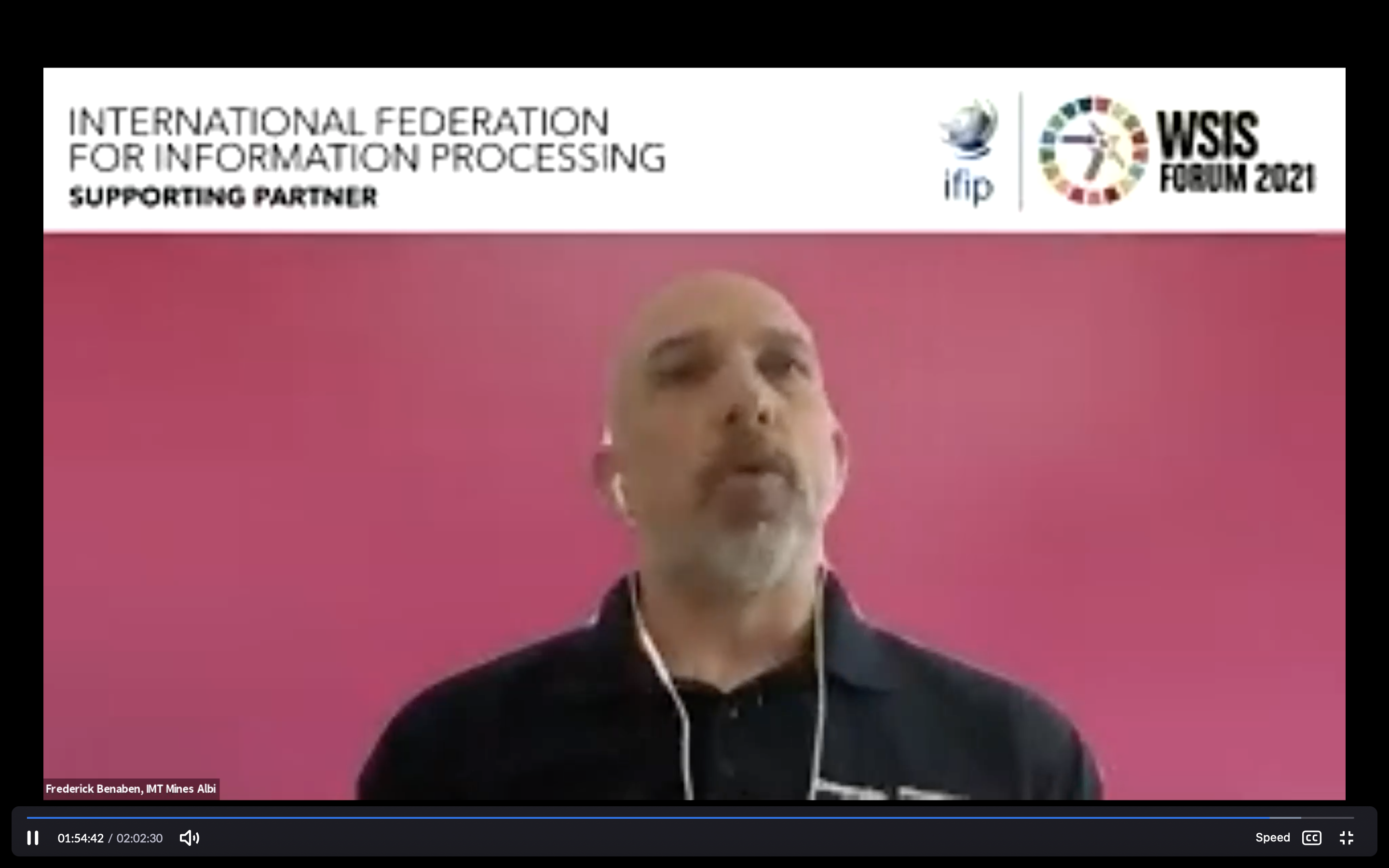IT in Disaster Risk Reduction (ITDRR)
International Federation for Information Processing
Session 257
After a decade from the Great Eastern Japan Earthquake and Tsunami
It has been a decade since we experienced a catastrophe in Japan, the Great Eastern Japan Earthquake and Tsunami on 11 March 2011. We have had so many and different types of disasters since then all over the world. Meanwhile ICT technology has been advancing dramatically in the decade such as mobile devices, IoT, Unmanned Aerial Vehicle(UAV), social media, blockchain and AI. Our workshop shall present how ICT could be of help at disaster.We have six presentations by the members of newly created IFIP WG5.15 members. Some of them are active members from ISCRAM (the Information Systems for Crisis Response and Management) community as well.
Workshop Programme
- 13:00-13:05 Introduction to the workshop
-
-
- Yuko Murayama (IFIP WG5.15 Chair)
-
-
- 13:05-13:20 Takeaways from the recents crisis and avenues for the future of crisis management
-
-
- Frederick Benaben (IMT Mines Albi, France)
-
-
- 13:20-13:35 WebEOC: How fit is it as the backbone of US disaster response management?
-
-
- Hans Jochen Scholl (University of Washington, U.S.A.)
-
-
- 13:35-13.50 Inside the Dutch National Corona Response: An information management view
-
-
- Kenny Meesters (Tilburg University, Netherlands)
-
-
- 13:50-14:00 Introduction to the IFIP ITDRR conferences
-
-
- Dimiter Velev (University of National and World Economy, Bulgaria)
-
-
- 14:00-14:15 ICT needs at Great Eastern Japan Earthquake and Tsunami on 11 March 2011
-
-
- Yuko Murayama
-
-
- 14:15-14:30 Risk culture in France, raising awareness and engaging citizens with digital technologies
-
-
- Caroline Rizza (I3 CNRS (UMR 9217), Telecom Paris, Institut Polytechnique de Paris, France)
-
-
- 14:30-14:55 Q&A and Panel discussion on how ICT could help response after a catastrophe like Great Eastern Japan Earthquake and Tsunami
- 14:55-15:00 Closing

Chair of the IFIP WG5.15 on IT in DRR
Professor Emeritus, Iwate Prefectural University, Japan
Researcher, Institute for Mathematics and Computer Science, Tsuda University, Japan
She had Ph.D. from University of London (attended Dept. of Computer Science, University College London). Her research interests include networking, security, the sense of security, trust and disaster informatics as well as inclusive issues.

Frederick BENABEN is Professor at the Industrial Engineering Center of IMT Mines Albi (15 faculties, 5 engineers and assistants, 30 PhD and Post-Doc. fellows).
He is since 2019 the head of the Safety and Crisis Management Lab of the Industrial Engineering Center of IMT Mines Albi (around 20 researchers including professors, assistant/associate-professors, engineers, PhD and Post-Doc students).
He is also since 2019 the co-director (with Prof. Benoit Montreuil) of the Associated International Lab SIReN (Sentient Immersive Response Networks Lab) between IMT Mines Albi and Georgia Tech.

Jochen serves as a Full Professor with tenure in the Information School at the University of Washington, Seattle, WA. From the University of Albany, NY/SUNY he earned a Ph.D. in Information Science. He also holds a Master's degree in Business Administration from the GSBA Zurich, Switzerland. His research interests are focused on disaster information management, smart governance/government, and information artifact evaluation.

Kenny Meesters (@k_meesters) is a researcher in information management at Tilburg University (NL), formerly employed at Delft University (NL) & University of Agder (NO). He focuses on information management in an operational setting in crisis response and disaster management. He has done various field studies in the aftermath of large disasters, and is also a member of various response mechanisms including the European Civil Protection Mechanism. In the early stages of the Corona pandemic Kenny was active in the National Operational Team Corona (LOT-C) as information manager. This coordinating body was introduced to support the various Safety Regions and other critical partners in the Netherlands. In addition to his IMO role, he also brought along three students to support the research during the response. Read about their experience: https://edu.nl/epabn

Caroline Rizza is Associate Professor in Information and Communication Sciences in the Economic and Social Sciences Department (UMR 9217) at Telecom Paris. She is the president of the ISCRAM Community (Information System for Crisis Response and Management International Community), and presently contributing for the French Ministry of Ecological Transition and Solidarity to the mission of modernization of risk culture in France with the (2020-2021).
Her research in crisis management focuses on the digital competences of actors in emergency situations, and on the associated ethical, legal and social issues: how citizen initiatives or actions, promoted by ICT, are changing the relationships between public and private institutions and citizens, and what attention needs to be paid to them. She coordinates multidisciplinary researches and training projects involving institutional partners: for instance, the "Combining digital tools and Living Lab for promoting a First Aid Citizen" project (2021-2023); the project MACIV "Management of Citizens and Volunteers: social media in crisis situation" (2018-2021), or the multidisciplinary CNRS Thematic School "Online social networks - crisis management".

Professor Dr. Dimiter Velev is with the Department of Information Technologies and Communications and the Director of the Science Research Center for Disaster Risk Reduction at the University of National and World Economy, Sofia, Bulgaria. Prof. Velev’s main areas of academic and R&D interest are Information Technology, ITC Application in Disaster Risk Reduction, Applied Artificial Intelligence and XR. He has published more than 200 ICT-related papers.
-
 C1. The role of governments and all stakeholders in the promotion of ICTs for development
C1. The role of governments and all stakeholders in the promotion of ICTs for development
-
 C2. Information and communication infrastructure
C2. Information and communication infrastructure
-
 C3. Access to information and knowledge
C3. Access to information and knowledge
-
 C4. Capacity building
C4. Capacity building
-
 C5. Building confidence and security in use of ICTs
C5. Building confidence and security in use of ICTs
-
 C6. Enabling environment
C6. Enabling environment
-
 C7. ICT applications: benefits in all aspects of life — E-government
C7. ICT applications: benefits in all aspects of life — E-government
-
 C7. ICT applications: benefits in all aspects of life — E-business
C7. ICT applications: benefits in all aspects of life — E-business
-
 C7. ICT applications: benefits in all aspects of life — E-learning
C7. ICT applications: benefits in all aspects of life — E-learning
-
 C7. ICT applications: benefits in all aspects of life — E-health
C7. ICT applications: benefits in all aspects of life — E-health
-
 C7. ICT applications: benefits in all aspects of life — E-employment
C7. ICT applications: benefits in all aspects of life — E-employment
-
 C7. ICT applications: benefits in all aspects of life — E-environment
C7. ICT applications: benefits in all aspects of life — E-environment
-
 C7. ICT applications: benefits in all aspects of life — E-agriculture
C7. ICT applications: benefits in all aspects of life — E-agriculture
-
 C7. ICT applications: benefits in all aspects of life — E-science
C7. ICT applications: benefits in all aspects of life — E-science
-
 C8. Cultural diversity and identity, linguistic diversity and local content
C8. Cultural diversity and identity, linguistic diversity and local content
-
 C9. Media
C9. Media
-
 C10. Ethical dimensions of the Information Society
C10. Ethical dimensions of the Information Society
-
 C11. International and regional cooperation
C11. International and regional cooperation
Disasters are considered in Action Lines C2 and C10, however, all the Action Lines could have disaster issues as well.
C1. Disaster management is one of the important risk management issues at governments as well as all stakeholders in the promotion of ICTs for development
C2. The availability of information and communication infrastructure is important for disaster resposne.
C3. Access to information and knowledge is important for situation awareness at disaster.
C4. Capacity building is needed for preparation and mitigation for disaster.
C5. Building confidence and security in use of ICTs for disaster communications including privacy issues.
C6. Enabling environment is closeley related to natural disaster.
C7. Disaster management required all the relevant ICT applications: benefits in all aspects of life — E-government, E-business, E-learning, E-health, E-employment, E-environment, E-agriculture and E-science.
C8. Cultural diversity and identity, linguistic diversity and local content: Disaster information should be shared by every citizen in the world for future preparedness and mutual support.
C9. Media is important once disaster happens to inform people of the current situations.
C10. Ethical dimensions of the Information Society: Ethical issues are important at disaster not to spread biased misinformation.
C11. International and regional cooperation is essential once a catastrophe occurs.
-
 Goal 1: End poverty in all its forms everywhere
Goal 1: End poverty in all its forms everywhere
-
 Goal 2: End hunger, achieve food security and improved nutrition and promote sustainable agriculture
Goal 2: End hunger, achieve food security and improved nutrition and promote sustainable agriculture
-
 Goal 3: Ensure healthy lives and promote well-being for all
Goal 3: Ensure healthy lives and promote well-being for all
-
 Goal 4: Ensure inclusive and equitable quality education and promote lifelong learning opportunities for all
Goal 4: Ensure inclusive and equitable quality education and promote lifelong learning opportunities for all
-
 Goal 5: Achieve gender equality and empower all women and girls
Goal 5: Achieve gender equality and empower all women and girls
-
 Goal 6: Ensure access to water and sanitation for all
Goal 6: Ensure access to water and sanitation for all
-
 Goal 7: Ensure access to affordable, reliable, sustainable and modern energy for all
Goal 7: Ensure access to affordable, reliable, sustainable and modern energy for all
-
 Goal 8: Promote inclusive and sustainable economic growth, employment and decent work for all
Goal 8: Promote inclusive and sustainable economic growth, employment and decent work for all
-
 Goal 9: Build resilient infrastructure, promote sustainable industrialization and foster innovation
Goal 9: Build resilient infrastructure, promote sustainable industrialization and foster innovation
-
 Goal 10: Reduce inequality within and among countries
Goal 10: Reduce inequality within and among countries
-
 Goal 11: Make cities inclusive, safe, resilient and sustainable
Goal 11: Make cities inclusive, safe, resilient and sustainable
-
 Goal 12: Ensure sustainable consumption and production patterns
Goal 12: Ensure sustainable consumption and production patterns
-
 Goal 13: Take urgent action to combat climate change and its impacts
Goal 13: Take urgent action to combat climate change and its impacts
-
 Goal 14: Conserve and sustainably use the oceans, seas and marine resources
Goal 14: Conserve and sustainably use the oceans, seas and marine resources
-
 Goal 15: Sustainably manage forests, combat desertification, halt and reverse land degradation, halt biodiversity loss
Goal 15: Sustainably manage forests, combat desertification, halt and reverse land degradation, halt biodiversity loss
-
 Goal 16: Promote just, peaceful and inclusive societies
Goal 16: Promote just, peaceful and inclusive societies
-
 Goal 17: Revitalize the global partnership for sustainable development
Goal 17: Revitalize the global partnership for sustainable development





